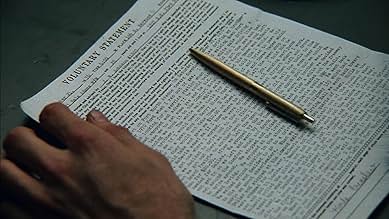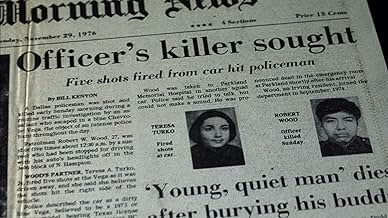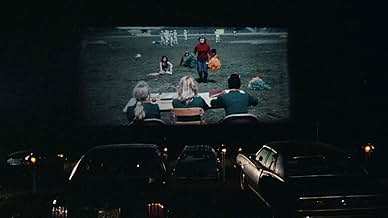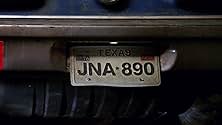CALIFICACIÓN DE IMDb
7.9/10
27 k
TU CALIFICACIÓN
Relata la historia de un hombre que fue condenado injustamente por asesinato por un sistema de justicia corrupto en el condado de Dallas, Texas.Relata la historia de un hombre que fue condenado injustamente por asesinato por un sistema de justicia corrupto en el condado de Dallas, Texas.Relata la historia de un hombre que fue condenado injustamente por asesinato por un sistema de justicia corrupto en el condado de Dallas, Texas.
- Dirección
- Guionista
- Elenco
- Premios
- 12 premios ganados y 5 nominaciones en total
- Dirección
- Guionista
- Todo el elenco y el equipo
- Producción, taquilla y más en IMDbPro
Opiniones destacadas
10mprins
Along with 1996's Paradise Lost, The Thin Blue Line should be mandatory viewing for those who believe that the criminal justice system eventually convicts only the guilty. It is a stark and shocking look at one man behind bars and the truckloads of evidence that point toward his innocence. Documentarian Errol Morris indirectly argues that, at the very least, this evidence should have presented a "reasonable doubt" to the jury, and near the end of the movie, the audience has little choice but to accept his unbelievable findings. And the film ends with a single scene of just a tape recorder and voices that should be recognized as one of the most powerful endings to a movie, ever. A documentary masterpiece.
A film that successfully argued that a man (Randall Dale Adams) was wrongly convicted for murder by a corrupt justice system in Dallas County, Texas.
Morris was originally going to film a documentary about prosecution psychiatrist, Dr. James Grigson, known as Doctor Death, who testified in more than 100 trials that resulted in death sentences. In almost every instance, Dr. Grigson would, after examining a defendant, testify that he had found the individual in question to be an incurable sociopath, who it was "one hundred per cent certain" would kill again.
This lead Morris to find an example, Adams, where this "incurable sociopath" status was in doubt. But we also still have that critique of Grigson -- we see what he said about Adams, a man with no history of criminal acts or violence, after only fifteen minutes with him.
This change in focus lead to a better film, most likely (though Erroll Morris has an incredible track record for good documentaries). We now get to see a wider picture of eyewitness testimony, the prejudice of the area (which includes a thriving KKK) and more.
Adams' case was reviewed and he was released from prison approximately a year after the film's release. Now that is the sign of a powerful film, and what makes documentaries so great.
Morris was originally going to film a documentary about prosecution psychiatrist, Dr. James Grigson, known as Doctor Death, who testified in more than 100 trials that resulted in death sentences. In almost every instance, Dr. Grigson would, after examining a defendant, testify that he had found the individual in question to be an incurable sociopath, who it was "one hundred per cent certain" would kill again.
This lead Morris to find an example, Adams, where this "incurable sociopath" status was in doubt. But we also still have that critique of Grigson -- we see what he said about Adams, a man with no history of criminal acts or violence, after only fifteen minutes with him.
This change in focus lead to a better film, most likely (though Erroll Morris has an incredible track record for good documentaries). We now get to see a wider picture of eyewitness testimony, the prejudice of the area (which includes a thriving KKK) and more.
Adams' case was reviewed and he was released from prison approximately a year after the film's release. Now that is the sign of a powerful film, and what makes documentaries so great.
10faraaj-1
I grew up in a society that strongly believes in the death penalty - a religion injunction based on the Islamic code of justice. I remember being told a story (don't know if its true) of how the US President visited Saudi Arabia and on the last day of his visit he was treated to some public be-headings. When he questioned the morality of it, his host informed him that the handful of criminals punished represented the entirety of the criminal population for the past one year. The moral being that harsh punishments prevent crimes and caring too much about the aggressor leads to high crime rates. I personally lost faith in the prison system many years ago after reading about the Milgram and Stanford Prison Experiment findings. A harrowing Australian movie, Ghosts of the Civil Dead made me detest the prison system even more. In recent years Abu Ghraib and Guantanamo have left a bad taste in the mouth. So, is the answer really the death penalty and other physical measures that can't be reversed? After seeing The Thin Blue Line I just don't know. This film has really affected me.
An innocent hitch-hiker, and from what I saw in the documentary a decent man, is caught at the wrong time in the wrong place - a former sundown town called Vidor, Dallas County. He is implicated in the murder of a cop and is obviously innocent of the crime. The entire legal system of Vidor is bent to prosecute him. The reason: the real killer is a 16-year old and there's no benefit in finding him guilty because he can't be given the death penalty. Randall Adams, in his 20's, can and must be punished because he's a stranger to these small-minded bigots and someone must pay! Shocking that people can think that way. It makes The Ox-Bow Incident and issues it raised 70 years ago valid even today. This was no more than a judicial lynching.
Fortunately, in this case Randall Adams' case was reopened and he was acquitted and released, in large measure due to this documentary and the scandal it caused. The story is exceedingly well told and the end with the tape recorded last interview with David Harris is chilling. I can't say that after watching this I still have a clear opinion of what punishment should fit a crime, but it has certainly made me question the validity of the mentality present in so many Muslim countries. Who is to say there can be no similar travesty of justice there?
An innocent hitch-hiker, and from what I saw in the documentary a decent man, is caught at the wrong time in the wrong place - a former sundown town called Vidor, Dallas County. He is implicated in the murder of a cop and is obviously innocent of the crime. The entire legal system of Vidor is bent to prosecute him. The reason: the real killer is a 16-year old and there's no benefit in finding him guilty because he can't be given the death penalty. Randall Adams, in his 20's, can and must be punished because he's a stranger to these small-minded bigots and someone must pay! Shocking that people can think that way. It makes The Ox-Bow Incident and issues it raised 70 years ago valid even today. This was no more than a judicial lynching.
Fortunately, in this case Randall Adams' case was reopened and he was acquitted and released, in large measure due to this documentary and the scandal it caused. The story is exceedingly well told and the end with the tape recorded last interview with David Harris is chilling. I can't say that after watching this I still have a clear opinion of what punishment should fit a crime, but it has certainly made me question the validity of the mentality present in so many Muslim countries. Who is to say there can be no similar travesty of justice there?
This is an extraordinary documentary in which film maker Errol Morris shows how an innocent man was convicted of murdering a policeman while the real murderer was let off scot free by the incompetent criminal justice system of Dallas, Texas. The amazing thing is that Morris demonstrates this gross miscarriage of justice in an utterly convincing manner simply by interviewing the participants. True, he reenacts the crime scene and flashes headlines from the newspaper stories to guide us, but it is simply the spoken words of the real murderer, especially in the cold-blooded, explosive audio tape that ends the film, that demonstrate not only his guilt but his psychopathic personality. And it is the spoken words of the defense attorneys, the rather substantial Edith James and the withdrawing Dennis White, and the wrongfully convicted Randall Adams that demonstrate the corrupt and incompetent methods used by the Dallas Country justice system to bring about this false conviction. Particularly chilling were the words of Judge Don Metcalfe, waxing teary-eyed, as he recalls listening to the prosecutor's summation about how society is made safe by that "thin blue line" of cops who give their lives to protect us from criminals. The chilling part is that while he is indulging his emotions he is allowing the cop killer to go free and helping to convict an innocent man. Almost as chilling in its revelation of just how perverted and corrupt the system has become, was the report of how a paid psychologist, as a means of justifying the death penalty, "interviewed" innocent Randall Adams for fifteen minutes and found him to be a danger to society, a blood-thirsty killer who would kill again.
This film will get your dander up. How the cops were so blind as to not see that 16-year-old David Harris was a dangerous, remorseless psychopath from the very beginning is beyond belief. He even took a delight in bragging about his crime. As Morris suggests, it was their desire to revenge the cop killing with the death penalty that blinded them to the obvious. They would rather fry an innocent man than convict the real murderer, who because of his age was not subject to the death penalty under Texas law. When an innocent man is wrongly convicted of a murder three things happen that are disastrous: One, an innocent man is in jail or even executed. Two, the real guilty party is free to kill again. And, three, the justice system is perverted. This last consequence is perhaps the worst. When people see their police, their courts, their judges condemning the innocent and letting the guilty walk free, they lose faith in the system and they begin to identify with those outside the system. They no longer trust the cops or the courts. The people become estranged from the system and the system becomes estranged from the people. This is the beginning of the breakdown of society. The Dallas cops and prosecutors and the stupid judge (David Metcalfe), who should have seen through the travesty, are to be blamed for the fact that David Harris, after he testified for the prosecution and was set free, did indeed kill again, as well as commit a number of other crimes of violence.
The beautiful thing about this film is, over and above the brilliance of its artistic construction, is that its message was so clear and so powerful that it led to the freeing of the innocent Randall Adams. Although the psychopathic David Harris, to my knowledge, was never tried for the crime he committed, he is in prison for other crimes and, it is hoped, will be there for the rest of his life. Errol Morris and the other people who made this fine film can pride in these facts and in knowing that they did a job that the Dallas criminal justice system was unable to do.
(Note: Over 500 of my movie reviews are now available in my book "Cut to the Chaise Lounge or I Can't Believe I Swallowed the Remote!" Get it at Amazon!)
This film will get your dander up. How the cops were so blind as to not see that 16-year-old David Harris was a dangerous, remorseless psychopath from the very beginning is beyond belief. He even took a delight in bragging about his crime. As Morris suggests, it was their desire to revenge the cop killing with the death penalty that blinded them to the obvious. They would rather fry an innocent man than convict the real murderer, who because of his age was not subject to the death penalty under Texas law. When an innocent man is wrongly convicted of a murder three things happen that are disastrous: One, an innocent man is in jail or even executed. Two, the real guilty party is free to kill again. And, three, the justice system is perverted. This last consequence is perhaps the worst. When people see their police, their courts, their judges condemning the innocent and letting the guilty walk free, they lose faith in the system and they begin to identify with those outside the system. They no longer trust the cops or the courts. The people become estranged from the system and the system becomes estranged from the people. This is the beginning of the breakdown of society. The Dallas cops and prosecutors and the stupid judge (David Metcalfe), who should have seen through the travesty, are to be blamed for the fact that David Harris, after he testified for the prosecution and was set free, did indeed kill again, as well as commit a number of other crimes of violence.
The beautiful thing about this film is, over and above the brilliance of its artistic construction, is that its message was so clear and so powerful that it led to the freeing of the innocent Randall Adams. Although the psychopathic David Harris, to my knowledge, was never tried for the crime he committed, he is in prison for other crimes and, it is hoped, will be there for the rest of his life. Errol Morris and the other people who made this fine film can pride in these facts and in knowing that they did a job that the Dallas criminal justice system was unable to do.
(Note: Over 500 of my movie reviews are now available in my book "Cut to the Chaise Lounge or I Can't Believe I Swallowed the Remote!" Get it at Amazon!)
Randall Adams was a drifter who was picked up by runaway teenager David Harris when he ran out of petrol. The two men hang out for a while, drank some beer, went to the movies, smoked some weed. At this point Adams says he went his own way to his motel with his brother, watched TV and went to sleep. Alternatively, Harris says the two men stayed together were stopped by the police when Adams took out a gun and opened fire on a police officer before driving off. This film follows the court case which charged Adams for the murder of a police officer, with the underage Harris (who was ineligible for the death penalty) as one of the main witnesses against him.
I do enjoy a Perry Mason film because, after a solid hour of red herrings and question-marks, it always come down to the big reveal with Mason demanding "isn't it true? ISN'T IT?" as everyone gasps, the guilty confesses on the stand and justice is done. Sadly this is not a documentary but a basic TVM series and what the Thin Blue Line does so effectively is to get passed all our ideas of how justice works from films and presents a near-unquestionable miscarriage of justice. At no point does the "guilty" person get totally exposed (although the suggestion is very clearly there as to who it was) but instead Morris goes after the idea of reasonable doubt (which, if there is any, then the charged should not have been convicted). Starting at the very start of the fateful evening, Morris uses interviews and some reconstructions to tell the story of what happened from various points of view initially with a focus very much on the events as the courts saw it.
From here he then uses these same contributions to inject a huge amount of doubt into the vast majority of the case for the prosecution. If you want to find it, there are things in here that could be taken as anti-death penalty but for me the film is pro-justice as opposed to anti-anything as it is essentially reinforcing the importance of reasonable doubt. By virtue of doing this, everyone involved looks bad and Morris wisely doesn't need to pick on anybody in particular directly. It is fascinating as a film but I can understand the occasional claim of it being "dull" I cannot agree with it but I can understand because, in a world where excess is the norm (style, action, violence, opinion) anything that is actually restrained and even handed could be taken as "dull".
This modern moaning aside though, The Thin Blue Line is a well made film that simply and matter-of-factly condemns the justice system as it applied to Randall Adams. One of Morris' best films and worth seeking out.
I do enjoy a Perry Mason film because, after a solid hour of red herrings and question-marks, it always come down to the big reveal with Mason demanding "isn't it true? ISN'T IT?" as everyone gasps, the guilty confesses on the stand and justice is done. Sadly this is not a documentary but a basic TVM series and what the Thin Blue Line does so effectively is to get passed all our ideas of how justice works from films and presents a near-unquestionable miscarriage of justice. At no point does the "guilty" person get totally exposed (although the suggestion is very clearly there as to who it was) but instead Morris goes after the idea of reasonable doubt (which, if there is any, then the charged should not have been convicted). Starting at the very start of the fateful evening, Morris uses interviews and some reconstructions to tell the story of what happened from various points of view initially with a focus very much on the events as the courts saw it.
From here he then uses these same contributions to inject a huge amount of doubt into the vast majority of the case for the prosecution. If you want to find it, there are things in here that could be taken as anti-death penalty but for me the film is pro-justice as opposed to anti-anything as it is essentially reinforcing the importance of reasonable doubt. By virtue of doing this, everyone involved looks bad and Morris wisely doesn't need to pick on anybody in particular directly. It is fascinating as a film but I can understand the occasional claim of it being "dull" I cannot agree with it but I can understand because, in a world where excess is the norm (style, action, violence, opinion) anything that is actually restrained and even handed could be taken as "dull".
This modern moaning aside though, The Thin Blue Line is a well made film that simply and matter-of-factly condemns the justice system as it applied to Randall Adams. One of Morris' best films and worth seeking out.
¿Sabías que…?
- TriviaErrol Morris spent 2-1/2 years tracking down the various players in the Randall Adams case and convincing them to appear in the film.
- ErroresDavid Harris talks about his older brother drowning at the age of four in 1963. He says it occurred "right after President Kennedy was assassinated I believe. Sometime right after that. During the summer". However Kennedy was killed in the third week of November, well after summer.
- Citas
Melvyn Carson Bruder: Prosecutors in Dallas have said for years - any prosecutor can convict a guilty man. It takes a great prosecutor to convict an innocent man.
- Créditos curiososDrawings from the Bender Visual Motor Gestalt Test © 1946, American Orthopsychiatric Association Inc. and Lauretta Bender, M.D.
Selecciones populares
Inicia sesión para calificar y agrega a la lista de videos para obtener recomendaciones personalizadas
- How long is The Thin Blue Line?Con tecnología de Alexa
Detalles
Taquilla
- Total en EE. UU. y Canadá
- USD 1,209,846
- Fin de semana de estreno en EE. UU. y Canadá
- USD 17,814
- 28 ago 1988
- Total a nivel mundial
- USD 1,209,846
- Tiempo de ejecución
- 1h 41min(101 min)
- Color
- Mezcla de sonido
- Relación de aspecto
- 1.85 : 1
Contribuir a esta página
Sugiere una edición o agrega el contenido que falta





































